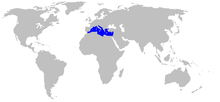
Back نبتة بوسيدون المحيطية Arabic نبته بوسيدون المحيطيه ARZ Posidonia oceanica Bulgarian Alga dels vidriers Catalan Posidonia oceanica CEB Arba marina Corsican Posidonie mořská Czech Neptungras German Ποσειδωνία η ωκεάνιος Greek Posidonia oceanica Spanish
| Posidonia oceanica | |
|---|---|

| |
| Scientific classification | |
| Kingdom: | Plantae |
| Clade: | Tracheophytes |
| Clade: | Angiosperms |
| Clade: | Monocots |
| Order: | Alismatales |
| Family: | Posidoniaceae |
| Genus: | Posidonia |
| Species: | P. oceanica
|
| Binomial name | |
| Posidonia oceanica | |

| |
| Posidonia oceanica range | |
Posidonia oceanica, commonly known as Neptune grass or Mediterranean tapeweed, is a seagrass species that is endemic to the Mediterranean Sea.[2] It forms large underwater meadows that are an important part of the ecosystem. The fruit is free floating and known in Italy as "the olive of the sea" (l'oliva di mare[3]). Balls of fibrous material from its foliage, known as egagropili or Neptune balls,[4] wash up to nearby shorelines.
The Posidonia has a very high carbon absorption capacity, being able to soak up 15 times more carbon dioxide every year than a similar sized piece of the Amazon rainforest.[5]
- ^ Pergent, G., Semroud, R., Djellouli, A., Langar, H. & Duarte, C. 2010. Posidonia oceanica. In: IUCN 2012. IUCN Red List of Threatened Species. Version 2012.2. <www.iucnredlist.org>. Downloaded on 9 January 2013.
- ^ Pansini, Arianna; Deroma, Mario; Guala, Ivan; Monnier, Briac; Pergent-Martini, Christine; Piazzi, Luigi; Stipcich, Patrizia; Ceccherelli, Giulia (1 April 2024). "The resilience of transplanted seagrass traits encourages detection of restoration success". Journal of Environmental Management. 357: 120744. Bibcode:2024JEnvM.35720744P. doi:10.1016/j.jenvman.2024.120744. ISSN 0301-4797. PMID 38552518.
- ^ "Posidonia oceanica" (PDF) (in Italian). Archived from the original (PDF) on 16 May 2006. Retrieved 8 April 2008.
Dopo essere fecondato, in estate fa crescere e maturare il suo frutto, l'oliva di mare (si chiama così perché ha una forma arrotondata).
- ^ "Seagrass 'Neptune balls' sieve millions of plastic particles from water, study finds". TheGuardian.com. 15 January 2021. Retrieved 16 January 2021.
Underwater seagrass in coastal areas appear to trap plastic pollution in natural bundles of fibre known as "Neptune balls", researchers have found.
- ^ "Climate change: 'Forever plant' seagrass faces uncertain future". BBC News. 13 March 2021. Retrieved 21 March 2021.
